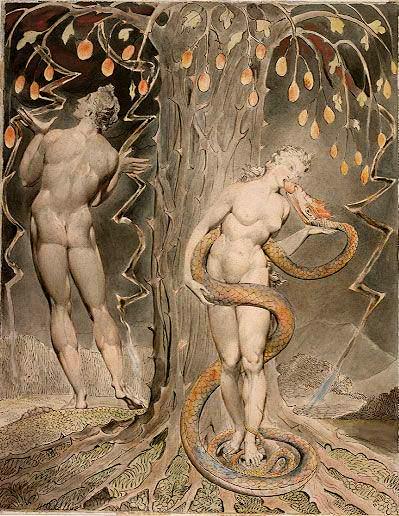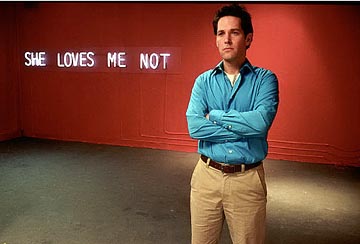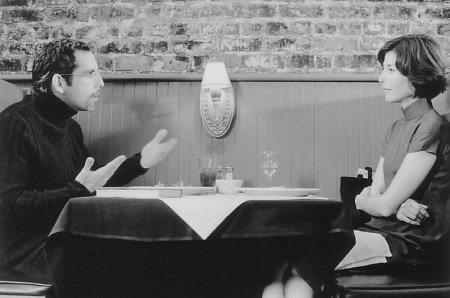
ENG480.001
Major Authors: Crossing Boundaries
The Question of Sin in the Works of John Milton and Neil LaBute
Prof. Eileen Joy
Fall 2009
Tue/Thur 12:30-1:45 pm (Peck Hall 0408)

Figure 1. William Blake, "The Temptation and Fall of Eve" (1808)
"Out of timber so crooked as that from which man is made nothing entirely straight can be built." (Immanuel Kant)
"Which way I fly is hell; myself am hell;
And in the lowest deep a lower deep,
Still threat’ning to devour me, opens wide,
To which the hell I suffer seems a heaven." (Satan, in John Milton, Paradise
Lost)
"We humans are a fairly barbarous bunch." (Neil LaBute)
COURSE DESCRIPTION
This course will be an in-depth study of the major works of two significant authors, the 17th-century English poet John Milton (1608-1674) and the contemporary American playwright Neil LaBute (b. 1963), two artists separated by over three centuries but whose writings share a deep preoccupation with the questions of morality and sin, and with the relationship “between the sexes” (or what is sometimes referred to as the “gender wars”), as well as "between men." Milton was well-known as an important spokesperson for and participant in the Protestant Reformation in England in the 1600s and LaBute, although his plays often seem to display a deeply cynical contempt for humanity, was for a long while a practicing Mormon who also studied theater at Brigham Young University (a Mormon institution). One of LaBute's works, a trilogy of short plays titled Bash: Latter-Day Plays, caused him to be "dis-fellowshipped" by the Mormon church (similar to excommunication in other religions, such as Catholicism). One of his plays, The Shape of Things, is a deliberate retelling of the story of the Fall (the two main characters, Adam and Evelyn, are stand-ins for Adam and Eve, but also for Adam and God-as-Artist, and Adam and Satan), the very subject that would form the center of Milton’s most important work, Paradise Lost. LaBute’s ouevre can be argued to pick up where Milton left off—telling the stories of men and women and their often poisoned relationships with each other "after the Fall" (meaning: after Adam and Eve are kicked out of paradise), and in this course we are going to explore how Milton’s (more hopeful) epic poem and LaBute’s (more cynical) plays, when brought into contact with each other, construct a conversation that has important relevance for us today when we consider the nature of what it means to be "postlapsarian" (one question: is such a concept even real?), to relate to others, what it might mean to be good, or to be "better" (as Adam puts it in LaBute's The Shape of Things), and what we think we mean when we talk about "sin."
As this is a senior-level literature course, preparing for and participating in class are vitally important to your ultimate success, and therefore, your contribution to in-class discussions as well as your attendance record will be factored into your final grade. Although I will provide much guidance and commentary, this is a discussion-, not a lecture-centered, course, and therefore students must come to class prepared with critical questions and comments related to the readings and films under discussion. As this is also a reading-intensive course, not keeping up with the reading could be extremely detrimental to your progress and final evaluation. One final (but important) word: coming to class without the text under discussion will be automatic grounds for dismissal from that particular class period (and will count as an absence).

Figure 2. still image from Neil Labute's film The Shape of Things (2003)
REQUIRED RENTAL TEXTS (available at SIUE Textbook Service)
John Milton, Paradise Lost (Norton Critical Edition), 3rd rev. ed. (W.W. Norton, 2004)
Neil LaBute, Your Friends and Neighbors (Faber and Faber, 1998)
Neil LaBute, Bash: Three Plays (Overlook, 1999)
Neil LaBute, The Shape of Things (Broadway, 2003)
Neil LaBute, Fat Pig (Faber and Faber, 2004)
Neil LaBute, Reasons to Be Pretty (Faber and Faber, 2008)
Neil LaBute, Some Girl(s) (Faber and Faber, 2006)
FILMS
In the Company of Men; The Shape of Things; Your Friends and Neighbors
COURSE REQUIREMENTS
1 CRITICAL PAPER, 8-10 pages, MLA-style format and documentation (50%)*
You are expected to develop your own, original topic and approaches; inclusion of secondary texts, critics, and ideas is required. This critical essay should deliver an original critical perspective and argument that takes up the themes of the course in relation to one or more of the primary literary texts we will have read this semester. Ideally, this paper should draw inspiration from the well of intellectual ideas encountered in class discussion, supplemented by additional secondary research (a minimum of five secondary sources). This paper can in NO way be what is called an "explanatory" research paper or "literature review" in which you simply provide an overview or summary of an author's work and/or career, or a survey of criticism on a particular author's work. To help you get started, go here for a working bibliography of sources relevant to the subjects under discussion in this course. For help with writing about literature, go here and here. For help with MLA-style research documentation and citation, go here.
*M.A. students will produce a paper of approximately 15-20 pages, with a minimum of 8-10 secondary sources
SHORT READING RESPONSES (40%)
To facilitate class discussion, you will write short responses (roughly in the neighborhood of 2-3 typed, double-spaced pages) to weekly readings. These short reading responses don't begin until after we've acclimated ourselves (typically in the third or fourth week of the course--see Schedule of Events below), and they are not due in the last few weeks of the course, in order to give you more time to devote to your critical paper. It is expected that, in these responses, you will critically engage the texts under discussion in relation to the ideas raised in class discussions and in relation to any ideas and/or texts encountered in other courses that might be relevant. These short responses will aid you in developing close reading skills and critical writing techniques that are crucial to your success with the longer critical paper, and it is imperative that these short responses NEVER do the following: a) merely summarize the reading; b) detail what you "like" or "don't like" about the reading, with no seriously critical commentary; c) evaluate the author's skill as a writer according to your personal aesthetic criteria; or d) use the reading as a point of departure for a discussion of something that has nothing to do with the reading or discussions in class.
Sample Exemplary Response Papers (from ENG441B Contemporary American Literature, Fiction: Spring 2008)
Wading in the Slipstream: A Close Reading of Amy Hempel's "The Uninvited"
A Close Reading of Amy Hempel's "The Annex"
A Close Reading of Amy Hempel's "Nashville Gone to Ashes"
A Meditation on the Narrator in Rick Moody's The Ice Storm
The world is repeating itself. The story of the world is happening again: Apocalyptic Change in Fiskadoro
Dreams About Ghosts in Fiskadoro
A Precarious Relationship to the Past: Fiskadoro
Ghosts, Hauntings, and the Past in Fiskadoro
Problematic Levels: Incest and Bastards in Oracle Night
Cutting the Knot of Oracle Night
Oracle Night's Not/Happy Ending
More Chance in Paul Auster's Fiction
Nathan Englander's "Twenty-Seventh Man"
PARTICIPATION (10%)
As stated above under "Course Description," participation is vital to your success in this course. That means having a good attendance record, coming to class prepared to discuss the readings (with book or books in hand), and actively contributing to critically engaged conversations with your professor and peers.
LATE ASSIGNMENT POLICY
I do not accept late assignments. Period. If there is an extraordinarily good reason for needing an extension on a due date, let me know in advance, and we will work it out.
ATTENDANCE POLICY
Attendance, promptness, and participation are essential to success in college courses. Faculty members recognize that unexpected occasions may arise when a student must be absent from class, but my general attendance policy is that if you are absent more than the number of required class sessions per week (in this case, that would be more than 2 sessions), I have the option of lowering your final course grade by one letter grade for each additional session missed. Furthermore, if absences become excessive (more than two weeks' worth of sessions), the SIUE Registrar, at my request, reserves the right to withdraw you administratively. For more information on this, please consult the following: SIUE Class Attendance Policy. Failure to attend class in a responsible and committed manner may thus be grounds for failure in or administrative withdrawal from the course.
ACADEMIC DISHONESTY
Any student found engaging in an act of academic dishonesty will be promptly dismissed from the course with a grade of "F." By "academic dishonesty," I mean PLAGIARISM (the act of representing the work of another as one's own), which the University considers a grave breach of intellectual integrity. All definitions, terminology, concepts, and patterns of organization taken from an outside source must be identified and given credit in any essay or exam you write--whether it be for the English department or any other department. For more detailed information on this, please consult the following: SIUE Plagiarism Policy.
SCHEDULE OF EVENTS (subject to revision as semester progresses)
| Tuesday | Aug. 25 | Introduction to Course |
| Thursday | Aug. 27 | Paradise Lost, Book I |
| "It would be difficult for me not to conclude that the most perfect type of masculine beauty is Satan, as portrayed by Milton." (Charles Baudelaire) | ||
| Cast of Paradise Lost | ||
| Outline of Paradise Lost | ||
| Miltonic Literary Terms | ||
| Ian Johnston, Lecture on Paradise Lost | ||
| film clip: Dogma (YouTube) | ||
| Tuesday | Sep. 1 | Paradise Lost, Books I & II |
| Notes on Paradise Lost (Books I & II) | ||
| John Milton, 1608-1674 (Luminarium) | ||
| Religious Writers of the English Renaissance (Luminarium) | ||
| English Literature: Early Seventeenth Century (Luminarum) | ||
| Thursday | Sep. 3 | Paradise Lost, Books I & II |
| Dante's Inferno Test | ||
| Dante's Inferno: A Virtual Tour of Hell | ||
| Dante's Inferno (Wikipedia) | ||
| darkness visible: a resource for studying Milton's Paradise Lost (Christ's College, Cambridge) | ||
| Tuesday | Sep. 8 | "I think there are a lot more Chads than we might imagine. Just because it's life. They don't even go to the expense of being charming. They're just in a position of being able to do it, and ultimately they're like, 'Well, fuck you. I'm gonna do this, and I don't really care'." (Neil LaBute, discussing In The Company of Men) |
| View: In the Company of Men (film) | ||
| Thursday | Sep. 10 | View: In the Company of Men (film) |
| Tuesday | Sep. 15 | Discuss: In the Company of Men (film) |
| response paper due | ||
| Thursday | Sep. 17 | NO CLASS--PROFESSOR AT SYMPOSIUM |
| Tuesday | Sep. 22 | "Can it be sin to know? Can it be death? And do they only stand by ignorance? Is that their happy state, the proof of their obedience and their faith?" (Satan, Book IV, Paradise Lost) |
| Paradise Lost, Book IV | ||
| "Felix Culpa" (Fortunate Fall) | ||
| Thursday | Sep. 24 | Paradise Lost, Book IV |
| Notes on Paradise Lost (Books IV, IX, and XII) | ||
| response paper due | ||
| Tuesday | Sep. 29 | "Once a label is on something, it becomes an it, like it's no longer alive. / It's like a loss of vision, or some dark compression, or a black spot on your eye." (Morcheeba, w. Kurt Wagner, "What New York Couples Fight About") |
| Paradise Lost, Book IX | ||
| Milton, "Doctrine and Discipline of Divorce" | ||
| Howard, "Milton's 'Divorcive' Liberties" | ||
| Thursday | Oct. 1 | Paradise Lost, Books IX & X |
| Jokinen, "sentence et solas: Joy and Sensuality in Paradise Lost Before and After the Fall" | ||
| response paper due | ||
| Tuesday | Oct. 6 | Paradise Lost, Book XII |
| Thursday | Oct. 8 | Concluding Discussion: Paradise Lost |
| response paper due | ||
| Tuesday | Oct. 13 | LaBute, Bash: Three Plays |
| YouTube Clip: Calista Flockhart in Bash | ||
| Thursday | Oct. 15 | NO CLASS: PROFESSOR AT CONFERENCE |
| Tuesday | Oct. 20 | LaBute, Bash: Three Plays |
| Interview with Neil LaBute | ||
| Without Mercy? Neil LaBute as Mormon Artist (follow link to "Electronic Articles," then to Volume 36, Number 2, Summer 2003, then scroll down in table of contents for that issue, and follow the link for the article cited above, and you can access either a .pdf or html version of the essay) | ||
| response paper due | ||
| Thursday | Oct. 22 | View: Your Friends and Neighbors (film) |
| Tuesday | Oct. 27 | Barry: But don't you think we're gonna have to . . . I mean, like pay for all this in the end? Cary: Possibly. I mean, if there ends up being a God or something like that whole eternity thing out there, like, then, yeah, probably so. I dunno. We'll see. But until then, we're on my time, okay? The interim is mine. (from LaBute, Your Friends and Neighbors) |
| View: Your Friends and Neighbors (film) | ||
| Thursday | Oct. 29 | Discuss: Your Friends and Neighbors (play & film) |
| response paper due | ||
| Tuesday | Nov. 3 | "Most of the time we plod along through life so wretchedly removed from our real feelings that we miss everything going on around us." (Neil LaBute, in an interview in BOMB magazine) |
| LaBute, Some Girl(s) | ||
| YouTube Clips: Some Girl(s), 1 & 2 | ||
| Thursday | Nov. 5 | LaBute, Some Girl(s) |
| response paper due | ||
| Tuesday | Nov. 10 | View: The Shape of Things (film) |
| Thursday | Nov. 12 | View: The Shape of Things (film) |
| Tuesday | Nov. 17 | Discuss: The Shape of Things (play & film) |
| Thursday | Nov. 19 | Special Class: Video Chat with Neil LaBute [Meet in Founders Hall, Room 2300] |
| Monday-Friday | Nov. 23-27 | NO CLASS: THANKSGIVING BREAK |
| Tuesday | Dec. 1 | LaBute, The Shape of Things & Fat Pig |
| Thursday | Dec. 3 | LaBute, Fat Pig |
| Tuesday | Dec. 8 | LaBute, Reasons to Be Pretty |
| Thursday | Dec. 10 | LaBute, Reasons to Be Pretty |
| Wednesday | Dec. 16 | CRITICAL PAPERS DUE: papers must be emailed to me at eileenajoy@gmail.com, and they should be formatted in Microsoft Word and saved with either a .doc or .docx file extension (by midnight). |

Figure 3. still image from Neil Labute's film Your Friends and Neighbors (1998)